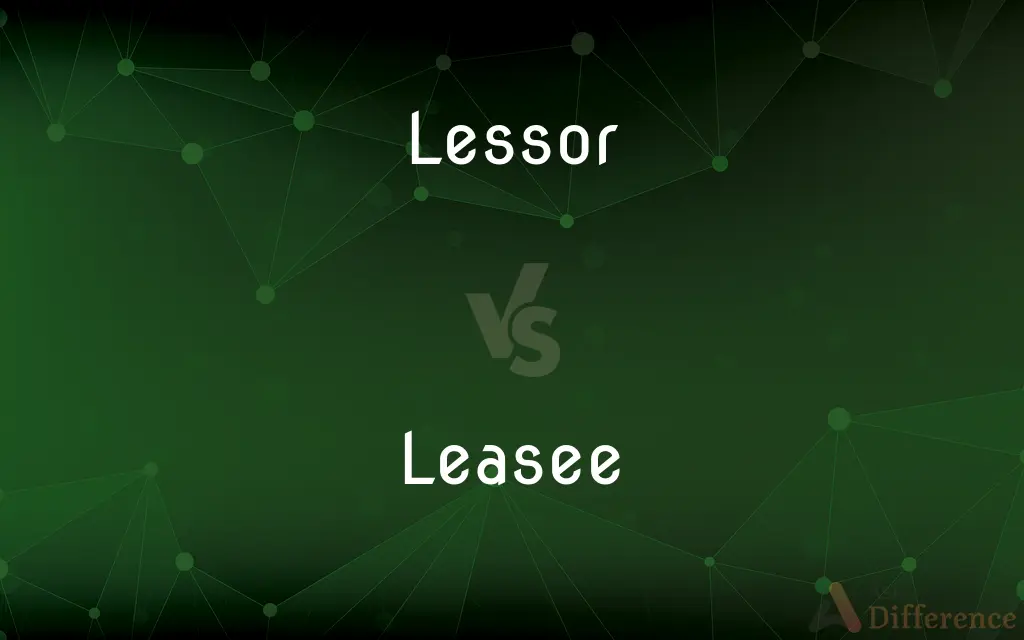Lessor vs. Leasee — What's the Difference?
Edited by Tayyaba Rehman — By Fiza Rafique — Updated on April 17, 2024
A lessor owns the asset and grants its use to others, while a lessee pays to use the asset for a specific period.

Difference Between Lessor and Leasee
Table of Contents
ADVERTISEMENT
Key Differences
A lessor is an individual or entity that owns a property or item and enters into an agreement to allow another party to use it. On the other hand, a lessee is the party that acquires the right to use this property or item by paying rent under the terms of a lease agreement.
The lessor retains ownership rights to the asset throughout the leasing period, whereas the lessee gains access to use the asset but does not own it.
In terms of financial responsibility, the lessor may be responsible for major repairs and maintenance, depending on the lease agreement. Conversely, the lessee typically handles minor repairs and regular maintenance.
The lessor has the power to set terms and conditions of the lease, such as duration, payment intervals, and permissible use of the asset. The lessee agrees to adhere to these terms in order to maintain the right to use the asset.
At the end of the lease term, the lessor expects the asset to be returned in a condition specified by the lease agreement. In contrast, the lessee must comply with these conditions to avoid penalties or additional charges.
ADVERTISEMENT
Comparison Chart
Role in Lease Agreement
Grants use of the asset
Acquires use of the asset
Ownership
Retains ownership of the asset
Does not gain ownership, only usage rights
Financial Responsibilities
Generally handles major repairs and insurance
Handles minor maintenance and operational costs
Rights
Sets terms of the lease agreement
Must comply with set terms
End of Lease Term
Receives the asset back, expects certain condition
Must return the asset in agreed-upon condition
Compare with Definitions
Lessor
A person or company who leases or rents property to another.
The lessor issued a new lease agreement to the tenants.
Leasee
Responsible for the maintenance within the lease terms.
The lessee fixed the plumbing issues as per the lease agreement.
Lessor
Owner of an asset provided on a lease to a lessee.
The lessor updated the property to increase its market value.
Leasee
Uses the leased asset for a period as per the agreement.
The lessee will have the car for a three-year lease period.
Lessor
The legal entity that holds the property rights.
As the lessor, the corporation retains several rights over the usage of its properties.
Leasee
A person or entity that rents or leases property from another.
The lessee agreed to the terms and signed the lease.
Lessor
Can take legal action in case of agreement breach.
The lessor has the right to terminate the lease if payments are delayed repeatedly.
Leasee
The party in a lease agreement that makes payments.
The lessee is responsible for monthly rent and utilities.
Lessor
A party in a lease agreement that receives payment.
The lessor receives monthly payments directly into her bank account.
Leasee
Holds no ownership over the property.
The lessee cannot make major changes to the layout of the leased house.
Lessor
One who leases property; a landlord.
Leasee
A person who leases something from a lessor; lessee.
Lessor
(property law) The owner of property that is leased; the landlord to a lease.
Lessor
One who leases; the person who lets to farm, or gives a lease.
Lessor
Someone who grants a lease
Common Curiosities
What responsibilities does a lessee have?
A lessee is responsible for regular payments, minor repairs, and maintenance as per the lease terms.
What happens if a lessee breaks a lease agreement?
If a lessee breaks a lease, they might lose their deposit or face legal action depending on the lease terms.
Who is a lessor in a lease agreement?
A lessor is the property owner who rents it out to another party.
What types of properties can a lessor lease?
Lessors can lease various types of properties, including residential, commercial, and industrial.
Is a lessee liable for damages to the property?
Yes, lessees are usually liable for damages caused during their lease term beyond normal wear and tear.
Can a lessee buy the property from a lessor?
Yes, a lessee can buy the property if both parties agree, typically under a lease-to-own agreement.
Does a lessor have the right to inspect the leased property?
Yes, lessors typically reserve the right to inspect their property as per the terms agreed in the lease.
How can a lessee terminate a lease agreement early?
A lessee may terminate a lease early by negotiating with the lessor or following termination provisions in the lease.
Who pays property taxes on leased properties?
Generally, the lessor pays the property taxes, but the lease agreement might specify otherwise.
Can a lessor increase the rent during the lease period?
A lessor can increase the rent if such terms are included in the lease agreement.
How does a lease agreement benefit a lessor?
It provides a steady income stream and ensures the property is maintained.
What is required for a valid lease agreement?
A valid lease agreement requires clearly defined terms, consent of both parties, and often a security deposit.
What are the benefits of being a lessee?
Benefits include not bearing the full cost of property ownership and flexibility in terms of relocating.
Can a lessee sublease the property to someone else?
A lessee can sublease if the lease agreement allows subletting.
What risks do lessors face?
Lessors risk property depreciation, damage by lessees, and potential legal disputes.
Share Your Discovery

Previous Comparison
Pod vs. Gam
Next Comparison
Mobile vs. MotileAuthor Spotlight
Written by
Fiza RafiqueFiza Rafique is a skilled content writer at AskDifference.com, where she meticulously refines and enhances written pieces. Drawing from her vast editorial expertise, Fiza ensures clarity, accuracy, and precision in every article. Passionate about language, she continually seeks to elevate the quality of content for readers worldwide.
Edited by
Tayyaba RehmanTayyaba Rehman is a distinguished writer, currently serving as a primary contributor to askdifference.com. As a researcher in semantics and etymology, Tayyaba's passion for the complexity of languages and their distinctions has found a perfect home on the platform. Tayyaba delves into the intricacies of language, distinguishing between commonly confused words and phrases, thereby providing clarity for readers worldwide.














































